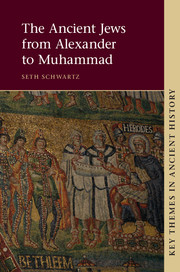Book contents
4 - The Jewish revolts, 66–135 ce
Published online by Cambridge University Press: 05 June 2014
Summary
BIRDS
Tacitus noted that ‘the Jews’ patience endured until the procuratorship of Gessius Florus’ (Hist. 5.10). The chain of events which sparked the revolt certainly confirms the historian’s view, which our main source, Josephus, shared, that Florus was a scoundrel (Ant. 20.252–6/Jewish War 2.277–9), but the initial episode in Josephus’ narrative chain has always defied interpretation (Jewish War 2.285–92): a ‘Greek’ of Caesarea Maritima owned a plot of land next to the synagogue and as an act of provocation built workshops on the land in a way which partly blocked access to the synagogue. The Jews offered Florus (whose palace was in the city) a bribe of eight silver talents, presumably to permit demolition of the workshops, but Florus took the money and decamped to Sebaste, leaving Caesarea in a state of high tension. One Sabbath the Jews arrived at the synagogue to find a Greek youth sacrificing birds on an upturned pot in the disputed passageway, an intolerable provocation. Violence erupted despite the intervention of the commander of the local equestrian ala, in the course of which the Jews seized ‘their laws’ and fled to the nearby Jewish town of Narbata. The leading Jewish citizen of Caesarea, John the Publican (telōnēs, perhaps a port official), marched off to Sebaste to remind Florus of the Jews’ generosity, but, instead of expressing gratitude, Florus put John and his entourage in chains on the charge of having removed ‘the laws’ from the city. News of this episode brought Jerusalem to the brink, and an ill-timed visit by the procurator himself to seize seventeen talents from the temple treasury nudged the city into open revolt (Jewish War 2.293–6).
- Type
- Chapter
- Information
- The Ancient Jews from Alexander to Muhammad , pp. 75 - 97Publisher: Cambridge University PressPrint publication year: 2014

